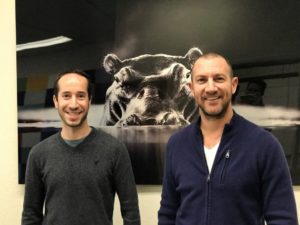I’m a big advocate of incremental IoT strategies (check out my recent webinar with Mendix on this approach), for existing companies that want to test the waters first. However, I’m enough of a rabble-rouser to also applaud those who jump right in with paradigm-busting IoT (and big data) startups.
Enter, stage left, a nimble (LOL) new home insurance company: Hippo!
IMHO, Hippo’s important both in its own right and also as a harbinger of other startups that will exploit the IoT and big data to break with years of tradition in the insurance industry as a whole, no longer sitting passively to pay out claims when something bad happens, but seizing the initiative to reduce risk, which is what insurance started out to do.
After all, when a Mr. B. Franklin (I’ll tell you: plunk that guy down in 2017 and he’d create a start-up addressing an unmet need within a week!) and his fellow firefighters launched the Philadelphia Contributionship in 1752, one of the first things they did was to send out appraisers to determine the risk of a house burning and suggest ways to make it safer.

Left to right: Eyal Navon, CTO and cofounder; Assaf Wand, CEO cofounder of Hippo
In fact, there’s actually a term for this kind of web-based insurance, coined by McKinsey: “insuretec” (practicing what he preached, one of Hippo’s founders had been at McKinsey, and what intrigued the founders about insurance as a target was that it’s a huge industry, hasn’t really innovate for years, and didn’t focus on the customer experience.).
I talked recently to two key staffers, Head of Product Aviad Pinkovezky and Head of Marketing, Growth and Product Innovation Jason White. They outlined a radically new strategy “with focused attention on loss reduction”:
- sell directly to consumers instead of using agents
- cut out legacy coverage leftovers, such as fur coats, silverware & stock certificates in a home safe) and instead cover laptops, water leaks, etc.
- Leverage data to inform customers about appliances they own that might be more likely to cause problems, and communicate with them on a continuous basis about steps such as cleaning gutters that could reduce problems.
According to Pinkovezky, the current companies “are reactive, responding to something that takes place. Consumer-to-company interaction is non-continuous, with almost nothing between paying premiums and filing a claim. Hippo wants to build must more of a continuous relationship, providing value added,” such as an IoT-based water-leak detection device that new customers receive.
At the same time, White said that the company is still somewhat limited in what if can do to reduce risk because so much of it isn’t really from factors such as theft (data speaks: he said thefts actually constitute little of claims) but from one, measured by frequency and amount of damage (according to their analysis) that’s beyond their control: weather. As I pointed out, that’s probably going to constitute more of a risk in the foreseeable future due to global warming.
Hippo also plans a high-tech, high-touch strategy, that would couple technnology with a human aspect that’s needed in a stressful situation such as a house fire or flood. According to Forbes:
“The company acknowledges that its customers rely on Hippo to protect their largest assets, and that insurance claims often derive from stressful experiences. In light of this, Hippo offers comprehensive, compassionate concierge services to help home owners find hotels when a home becomes unlivable, and to supervise repair contractors when damage occurs.”
While offering new services, the company has firm roots in the non-insuretech world, because its policies are owned and covered by Topa, which was founded more than 30 years ago.
Bottom line: if you’re casting about for an IoT-based startup opportunity, you’d do well to use the lens McKinsey applied to insurance: look for an industry that’s tradition-bound, and tends to react to change rather than initiate it (REMEMBER: a key element of the IoT paradigm shift is that, for the first time, we can piece “universal blindness” and really see inside things to gauge how they are working [or not] — the challenge is to capitalize on that new-found data).
